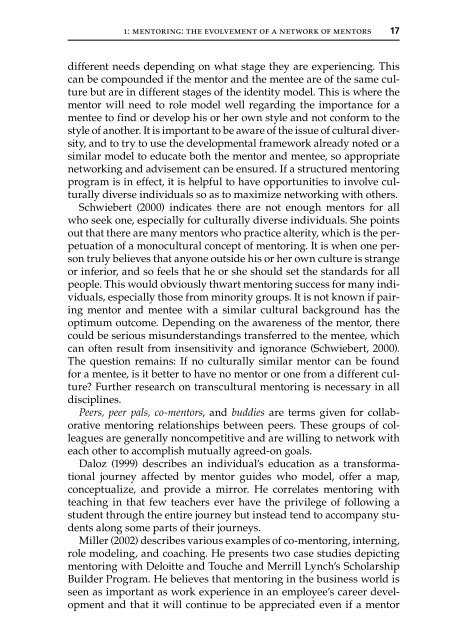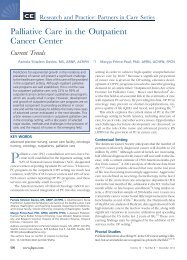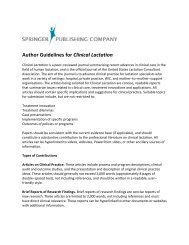Mentoring in Nursing - Springer Publishing
Mentoring in Nursing - Springer Publishing
Mentoring in Nursing - Springer Publishing
Create successful ePaper yourself
Turn your PDF publications into a flip-book with our unique Google optimized e-Paper software.
1: mentor<strong>in</strong>g: the evolvement of a network of mentors 17<br />
different needs depend<strong>in</strong>g on what stage they are experienc<strong>in</strong>g. This<br />
can be compounded if the mentor and the mentee are of the same culture<br />
but are <strong>in</strong> different stages of the identity model. This is where the<br />
mentor will need to role model well regard<strong>in</strong>g the importance for a<br />
mentee to f<strong>in</strong>d or develop his or her own style and not conform to the<br />
style of another. It is important to be aware of the issue of cultural diversity,<br />
and to try to use the developmental framework already noted or a<br />
similar model to educate both the mentor and mentee, so appropriate<br />
network<strong>in</strong>g and advisement can be ensured. If a structured mentor<strong>in</strong>g<br />
program is <strong>in</strong> effect, it is helpful to have opportunities to <strong>in</strong>volve culturally<br />
diverse <strong>in</strong>dividuals so as to maximize network<strong>in</strong>g with others.<br />
Schwiebert (2000) <strong>in</strong>dicates there are not enough mentors for all<br />
who seek one, especially for culturally diverse <strong>in</strong>dividuals. She po<strong>in</strong>ts<br />
out that there are many mentors who practice alterity, which is the perpetuation<br />
of a monocultural concept of mentor<strong>in</strong>g. It is when one person<br />
truly believes that anyone outside his or her own culture is strange<br />
or <strong>in</strong>ferior, and so feels that he or she should set the standards for all<br />
people. This would obviously thwart mentor<strong>in</strong>g success for many <strong>in</strong>dividuals,<br />
especially those from m<strong>in</strong>ority groups. It is not known if pair<strong>in</strong>g<br />
mentor and mentee with a similar cultural background has the<br />
optimum outcome. Depend<strong>in</strong>g on the awareness of the mentor, there<br />
could be serious misunderstand<strong>in</strong>gs transferred to the mentee, which<br />
can often result from <strong>in</strong>sensitivity and ignorance (Schwiebert, 2000).<br />
The question rema<strong>in</strong>s: If no culturally similar mentor can be found<br />
for a mentee, is it better to have no mentor or one from a different culture?<br />
Further research on transcultural mentor<strong>in</strong>g is necessary <strong>in</strong> all<br />
discipl<strong>in</strong>es.<br />
Peers, peer pals, co-mentors, and buddies are terms given for collaborative<br />
mentor<strong>in</strong>g relationships between peers. These groups of colleagues<br />
are generally noncompetitive and are will<strong>in</strong>g to network with<br />
each other to accomplish mutually agreed-on goals.<br />
Daloz (1999) describes an <strong>in</strong>dividual’s education as a transformational<br />
journey affected by mentor guides who model, offer a map,<br />
conceptualize, and provide a mirror. He correlates mentor<strong>in</strong>g with<br />
teach<strong>in</strong>g <strong>in</strong> that few teachers ever have the privilege of follow<strong>in</strong>g a<br />
student through the entire journey but <strong>in</strong>stead tend to accompany students<br />
along some parts of their journeys.<br />
Miller (2002) describes various examples of co-mentor<strong>in</strong>g, <strong>in</strong>tern<strong>in</strong>g,<br />
role model<strong>in</strong>g, and coach<strong>in</strong>g. He presents two case studies depict<strong>in</strong>g<br />
mentor<strong>in</strong>g with Deloitte and Touche and Merrill Lynch’s Scholarship<br />
Builder Program. He believes that mentor<strong>in</strong>g <strong>in</strong> the bus<strong>in</strong>ess world is<br />
seen as important as work experience <strong>in</strong> an employee’s career development<br />
and that it will cont<strong>in</strong>ue to be appreciated even if a mentor
















